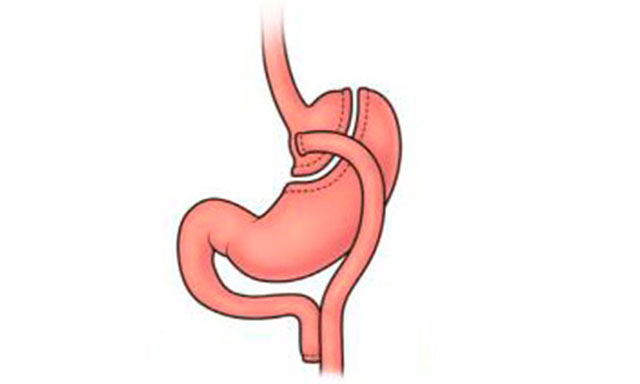There are two components to the procedure. First, a small stomach pouch, approximately one ounce or 30 milliliters in volume, is created by dividing the top of the stomach from the rest of the stomach.
Next, the first portion of the small intestine is divided, and the bottom end of the divided small intestine is brought up and connected to the newly created small stomach pouch.
The procedure is completed by connecting the top portion of the divided small intestine to the small intestine further down so that the stomach acids and digestive enzymes from the bypassed stomach and first portion of small intestine will eventually mix with the food.
First, similar to most bariatric procedures, the newly created stomach pouch is considerably smaller and facilitates significantly smaller meals, which translates into less calories consumed.
Additionally, because there is less digestion of food by the smaller stomach pouch, and there is a segment of small intestine that would normally absorb calories as well as nutrients that no longer has food going through it, there is probably to some degree less absorption of calories and nutrients.
Most importantly, the rerouting of the food stream produces changes in gut hormones that promote satiety, suppress hunger, and reverse one of the primary mechanisms by which obesity induces type 2 diabetes.
Produces significant long-term weight loss (60 to 80 percent excess weight loss).
Restricts the amount of food that can be consumed.
May lead to conditions that increase energy expenditure.
Produces favorable changes in gut hormones that reduce appetite and enhance satiety.
Typical maintenance of >50% excess weight loss.
It is technically a more complex operation than the AGB or LSG and potentially could result in greater complication rates.
It can lead to long-term vitamin/mineral deficiencies, particularly deficits in vitamin B12, iron, calcium, and folate.
Generally has a longer hospital stay than the AGB.
Requires adherence to dietary recommendations, life-long vitamin/mineral supplementation, and follow-up compliance.
In order to offer you the tool that suits you best, it is very IMPORTANT for US to know about your medical history.
A detailed health questionnaire with as much information as possible helps us to get to know our patient beforehand.
©2023 Dr. Luis Pasten | Overweight Reduction Center | All Rights Reserved.

